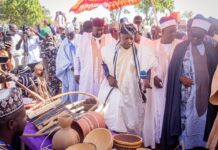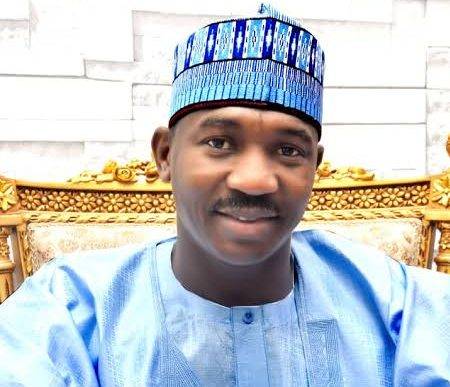 Governor Rochas Okorocha is an interesting personality who never lacks ideas about governance. When I read his olive branch extended to some retired permanent secretaries in Imo State last year, I came away with an impression that the man is not only an administrator but a philosopher to the core because his novel offer to the permanent secretaries who have stayed for over nine months without pension was not something anybody waiting for pension would accept without putting up a fight. Expectedly, the retired civil servants sued Imo State Government for withholding their legitimate pay without any cause. The case is awaiting hearing at an Imo High Court.
Governor Rochas Okorocha is an interesting personality who never lacks ideas about governance. When I read his olive branch extended to some retired permanent secretaries in Imo State last year, I came away with an impression that the man is not only an administrator but a philosopher to the core because his novel offer to the permanent secretaries who have stayed for over nine months without pension was not something anybody waiting for pension would accept without putting up a fight. Expectedly, the retired civil servants sued Imo State Government for withholding their legitimate pay without any cause. The case is awaiting hearing at an Imo High Court.
The quintessential Okorocha three weeks ago blew my mind with another innovation in governance when he played the role of a Guest Lecturer at the quarterly public lecture series of the National Institute for Cultural Orientation (NICO) which held at the Shehu ‘YarAdua Centre on March 2, 2017. Governor Okorocha spoke on the theme “Promoting Culture, Developing the Economy: A Nigerian Perspective.”
As a former Cultural Officer myself at the U.S. Embassy,where I promoted both the American and Nigerian cultures through various programmes and initiatives, I wondered why NICO invited Governor Okorocha to deliver the lecture instead of a Sociology Professor or any reputable cultural affairs expertfrom the public service or private sector. I felt Governor Okorocha was not a good choice for this public lecture series that had nothing or less to do with governance, and much to do with custodianship of our cultural heritage, which is the main mandate of NICO.
But in his characteristic manner of scooping water out of arock, Gov. Okorocha did not disappoint even as he had no written speech to deliver. He began by defining culture and its role in the development of the Nigerian economy. The amiable governor spoke like a professor of cultural studies when he asked the putative question: ‘Is recession in our culture?” I knew he was not expecting any answer from the audience, but wanted to make a point regarding the relationship between culture and the current economic recession Nigerians are going through.
It was the contention of Governor Okorocha that nothing is wrong with either the economy of Nigeria or the Nigerian nation. Nor is the God against the nation. He believes there is a missing link between the potentials that nature has bestowed on our country and the vision of its past leaders. That missing link is poor management of the economy by a leadership that relegated culture to the background.
Governor Okorocha illustrated this lack of vision with the poor management of Nigeria’s oil revenue by the previous administration, whereby the nation earned $100 for every barrel of crude oil sold during the period, but did not save enough which catapulted the nation into the current recession.
What does that mean in real terms? It means that Nigerians have to drop from the level of comfort they enjoyed under President Jonathan’s administration, and drop they did since President Muhammadu Buhari took over in May 2015. What Okorocha seems to suggest is that if we had sustained agriculture, which is our culture, as our major source as revenue, Nigeria would not have been in recession today.
Okorocha’s argument is that the current recession is a self-imposed phenomenon occasioned by our failure to apply culture in the management our vast human and material resources. He believes that God gave cultures and resources to every nation so that those in government, regardless of the type of system they operate, can guide the citizens to utilize the resources for a good living.
The connection between culture and economy in Okorocha’s treatise is that one complements the other. The development of our economy is tied to promoting of our culture – which is expressed through food, language, clothes, acts of worship, vocations, tools etc –because what we have is so unique to us that other people, nations, and races will appreciate more in its original form.
The missing link Okorocha was referring to is that Nigerians from the national leadership down to people in rural communities have abandoned our culture and embraced alien one that we can’t present with accuracy and decorum because it’s not our own – it’s a borrowed rob -kayanaroabinbanza ne – as late Adamu Dan-Maraya Jos said in one of his popular titles.
What is Governor Okorocha doing to promote his culture? That’s where he blew my mind when he spoke. I have not been to Imo State in the last five years, so I can’t confirm Governor Okorocha’s claims but I must admit that he caught my fancy.
Imo is the only state in Nigeria with Community Government as the fourth tier. In his efforts to cut down on government expenditure, reduce waste and diversion of public funds, as well as eliminate substandard work by contractors, Governor Okorocha established 644 Community Governments led by traditional rulers. Their work is enormous as they supervise projectsand report on security matters, in addition to their role as guardians of their cultures.
In furtherance of their new role, the governor allocated N1 million to each of the Community Governments to execute pilot projects in their communities. The outcome was quite astounding as the communities get value for the little amount spent by government. Since then, Community Governments have remained an active and visible institution in Imo State that nobody takes for granted.
Another area where Governor Okorocha has used culture to achieve appreciable results is security. Instead of giving the federal security agencies operating in the state huge sum of money as security votes that usually ended up in private pockets, the governor turned inward by giving the Community Governments little amount as security vote to provide surveillance for their communities through the use of volunteers and traditional reporting systems that proved more effective than the conventional ones.
Governor Okorocha is calling for the adoption of tradition oath for public office holders, who should be compelled to take an oath of office by swearing to their Chi, Dodo, Spirit, or Jujuthat if they steal public funds the spirit so invoked should kill or destroy their families. He believed this will be more effective in checking corruption thanswearing bythe Bible or Qur’an which consequences the oath takers believe will not manifest instantly.
“As we all know, if you swear to an oath using any of the traditional gods and abuse your office, you’ll face the consequences immediately!” said Okorocha.
Even in the educational sector, Okorocha feels there is need for revising the curriculum of our high schools to adopt local languages in teaching instead of English. He questioned the rational for tasking students to score credit in English language while their local languages are made optional.
As Nigeria continues the search for a viable alternative source of foreign exchange, Governor Okorocha believes it’s time Nigerians developed the vast tourism potential they have by integrating some of the rich cultural heritage into the tourism policy. For instance, our dress should be a national pride instead of adopting English wears. The way we build our homes need to be changed and revert to traditional architecture with modifications.
Many cultural experts believe that material culture could be converted into cashif it is well packaged and marketed by those who understand the terrain. There are many countries that export their foods abroad, earning foreign exchange. Many export their dress to other countries and bring in other products with their earnings. Those are countries that we will never hear complaining of recession because they have something to exchange with other countries without depleting their foreign reserve.
Nigerians should begin to think along this line. But there is need for visionary leaders to drive the process; otherwise it will fail from inception.
As an advocate of cultural restoration to build Nigerian economy, Governor Okorocha and many others sharing his vision, wondered why Nigeria abandoned its own culture (agriculture) in 1970s and embraced oil (managed by another man’s culture). They want a reversal of the situation as a panacea to the current recession. President MuhammaduBuhari seems to have shared their vision with his ongoing diversification policy that givesprominence to agriculture and exploration of hard minerals.
The Federal Government through the Ministry of Information and Culture is also doing so much to promote this vision. As the Minster of Information, AlhajiLai Mohammed explained at the public lecture, the Ministry is collaborating with many state governments to monetize festivals to enable their organizers and sponsors generate revenue from it. Some 40 staff of the Ministry are being trained on the modalities and procedure to provide the needed expertise to make the project a success.
The Ministry is also putting in place a strong mechanism to check piracy of intellectual property that denies owners their rightful benefits from their efforts. The new strategy is emphasizing on using technology to detect and block perpetrators of piracy since the law enforcement alternative has not proved effective.
Another area being addressed by the Ministry is the poor performance of theaters as platforms for promoting culture. With the ongoing efforts to support theater operators to modernize, the Ministry hopes to revive theaters and incorporate them in their master plan. The National Theater, Igamu Lagos would be the first beneficiary of this effort as discussion is ongoing between the Ministry and Lagos State Government to rehabilitate the facility and make it vibrant.
It is pertinent to note that the advocacy for integrating culture into national development plan is championed by a detribalized Nigerian of Rochas Okorocha’s standing. This is a timely call to action that should be embraced by other governors and other well-meaning Nigerians. If recession is not in our culture, Governor Okorocha opined, certainly we need to refocus our thinking on other ways we can promote economic development through culture promotion.



